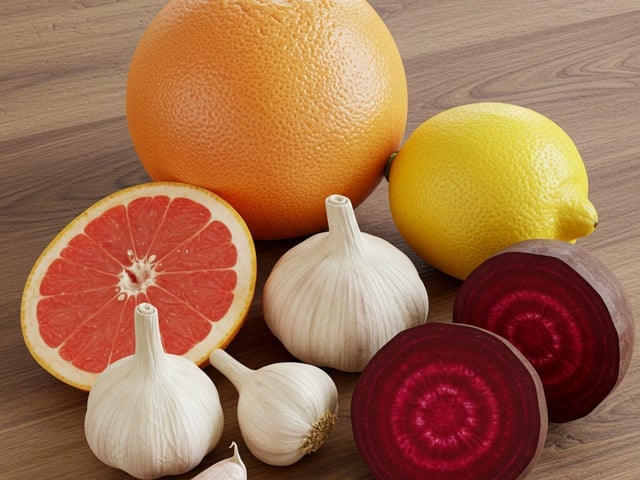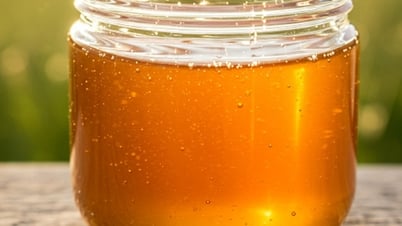According to Cérine Cherkaoui, a nutritionist in the UK, nutrients that are good for liver health include antioxidants (such as vitamins C and E) found in fruits and vegetables, which help reduce oxidative stress.
Minerals such as selenium and zinc can also support liver enzymes. In addition, choline - an essential nutrient in the B vitamin group - is also considered a "silent hero" because it helps transport fat out of the liver, limiting the risk of non-alcoholic fatty liver disease, according to the health news site Prevention (USA).

Drinking water helps the liver eliminate waste
PHOTO: AI
Additionally, folate — a B vitamin — plays an important role in methylation and detoxification, which is essential for liver function.
Last but not least: Fiber. “Fiber is great for overall health and liver health, but it’s often overlooked,” says Cherkaoui. “It plays a key role in regulating blood sugar and cholesterol, improving insulin sensitivity, aiding digestion, and promoting coordination between the gut and liver to process food and waste, keeping the body’s systems in balance.”
Garlic fights hepatitis, beets help detoxify the liver
Foods that Cherkaoui and other experts say are especially good for liver function include:
Lemon : This citrus fruit is rich in vitamin C, which can stimulate bile production and enhance the liver's detoxification abilities.
Artichoke : Artichoke cores are rich in antioxidants and fiber, which reduce liver fat and improve cholesterol metabolism.
One notable and unique antioxidant in artichokes is cynarin, which aids bile flow and protects liver cells, adds Cherkaoui.
Lentils : Lentils and beans in general are rich in folate. They are also an excellent source of fiber and protein, can replace saturated fat and red meat in meals, support blood sugar control and normal bowel and liver function.
Nuts : Walnuts and almonds are rich in omega-3 fatty acids and vitamin E, both of which help reduce oxidative stress and inflammation in the liver, help regulate fat metabolism, and improve cholesterol levels. Overall, controlling these markers can help reduce the risk of liver disease.
Grapefruit : Grapefruit contains the flavonoid naringenin - an antioxidant that can help improve insulin sensitivity and glucose metabolism, thus benefiting liver health.

Grapefruit, garlic, lemon, beetroot... are very good for the liver.
Photo: AI
Berries : Blueberries and raspberries, due to their deep red and blue colors, are rich in anthocyanins — antioxidants that may help address age-related liver changes.
Extra virgin olive oil : Use olive oil for cooking, making sauces, and drizzling over dishes to add flavor and benefit the liver.
Garlic : Garlic is a natural anti-inflammatory that helps boost liver enzyme activity.
A 2020 study found that consuming garlic powder at 800 mg/day for 15 weeks improved fatty liver disease, liver enzymes, lipid profiles, and fasting blood sugar in patients with non-alcoholic fatty liver disease.
Beets : Beets are rich in antioxidants like betalains, which aid in liver detoxification.
Salmon : Fatty fish in general are rich in omega-3 fatty acids, which may reduce liver inflammation.
Whole grains : Grains like oats and quinoa provide the fiber beta-glucan, which lowers cholesterol and supports gut-liver function.
Cruciferous Vegetables : Cauliflower, Brussels sprouts, broccoli and their cruciferous cousins provide fiber and antioxidants, which are good for liver and gut health.
Coffee is one of the most widely studied beverages for liver health, Cherkaoui adds. When consumed in moderation, it has been shown to lower liver enzyme levels and protect liver cells thanks to its rich antioxidant content.
However, when suddenly adding any food, patients should consult a doctor to ensure health safety.
Foods that are bad for the liver
Ultra-processed foods : Deep-fried foods, deli meats, refined sugars found in cereals, pastries, and sugary drinks. These are high in trans fats, seed oils, added sugars, and preservatives, which can cause inflammation, worsen insulin resistance, and promote fat accumulation in the liver.
Sugar : The simple sugar fructose is especially processed in the liver, where it is converted into fat, which can cause fatty liver disease if consumed in excess.
Alcohol : When consumed, alcohol is metabolized into acetaldehyde, a toxic byproduct that damages liver cells and can lead to liver diseases, including liver cancer.
Cheeses and red meats : Promote fat accumulation in the liver, leading to non-alcoholic fatty liver disease.
Source: https://thanhnien.vn/an-ngon-an-khoe-gan-se-duoc-bao-ve-voi-cac-thuc-pham-sau-18525051511342109.htm



![[Photo] National Assembly Chairman Tran Thanh Man meets with Thai Prime Minister Paetongtarn Shinawatra](https://vphoto.vietnam.vn/thumb/1200x675/vietnam/resource/IMAGE/2025/5/15/e71160b1572a457395f2816d84a18b45)


![[Photo] Prime Ministers of Vietnam and Thailand visit the Exhibition of traditional handicraft products](https://vphoto.vietnam.vn/thumb/1200x675/vietnam/resource/IMAGE/2025/5/15/6cfcd1c23b3e4a238b7fcf93c91a65dd)






















































































Comment (0)